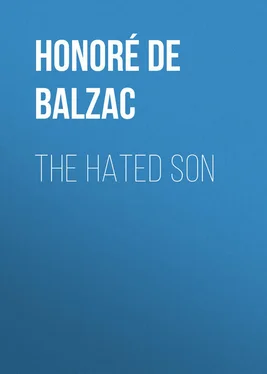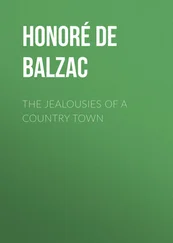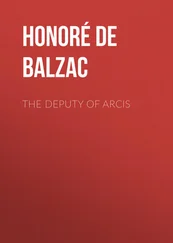Honoré Balzac - The Hated Son
Здесь есть возможность читать онлайн «Honoré Balzac - The Hated Son» — ознакомительный отрывок электронной книги совершенно бесплатно, а после прочтения отрывка купить полную версию. В некоторых случаях можно слушать аудио, скачать через торрент в формате fb2 и присутствует краткое содержание. Жанр: literature_19, foreign_antique, foreign_prose, на английском языке. Описание произведения, (предисловие) а так же отзывы посетителей доступны на портале библиотеки ЛибКат.
- Название:The Hated Son
- Автор:
- Жанр:
- Год:неизвестен
- ISBN:нет данных
- Рейтинг книги:5 / 5. Голосов: 1
-
Избранное:Добавить в избранное
- Отзывы:
-
Ваша оценка:
- 100
- 1
- 2
- 3
- 4
- 5
The Hated Son: краткое содержание, описание и аннотация
Предлагаем к чтению аннотацию, описание, краткое содержание или предисловие (зависит от того, что написал сам автор книги «The Hated Son»). Если вы не нашли необходимую информацию о книге — напишите в комментариях, мы постараемся отыскать её.
The Hated Son — читать онлайн ознакомительный отрывок
Ниже представлен текст книги, разбитый по страницам. Система сохранения места последней прочитанной страницы, позволяет с удобством читать онлайн бесплатно книгу «The Hated Son», без необходимости каждый раз заново искать на чём Вы остановились. Поставьте закладку, и сможете в любой момент перейти на страницу, на которой закончили чтение.
Интервал:
Закладка:
The child, threatened with death before its life began, made so vigorous a movement that she cried aloud, in a voice that seemed like a sigh, “Poor babe!”
She said no more; there are ideas that a mother cannot bear. Incapable of reasoning at this moment, the countess was almost choked with the intensity of a suffering as yet unknown to her. Two tears, escaping from her eyes, rolled slowly down her cheeks, and traced two shining lines, remaining suspended at the bottom of that white face, like dewdrops on a lily. What learned man would take upon himself to say that the child unborn is on some neutral ground, where the emotions of its mother do not penetrate during those hours when soul clasps body and communicates its impressions, when thought permeates blood with healing balm or poisonous fluids? The terror that shakes the tree, will it not hurt the fruit? Those words, “Poor babe!” were they dictated by a vision of the future? The shuddering of this mother was violent; her look piercing.
The bloody answer given by the count at the banquet was a link mysteriously connecting the past with this premature confinement. That odious suspicion, thus publicly expressed, had cast into the memories of the countess a dread which echoed to the future. Since that fatal gala, she had driven from her mind, with as much fear as another woman would have found pleasure in evoking them, a thousand scattered scenes of her past existence. She refused even to think of the happy days when her heart was free to love. Like as the melodies of their native land make exiles weep, so these memories revived sensations so delightful that her young conscience thought them crimes, and sued them to enforce still further the savage threat of the count. There lay the secret of the horror which was now oppressing her soul.
Sleeping figures possess a sort of suavity, due to the absolute repose of both body and mind; but though that species of calmness softened but slightly the harsh expression of the count’s features, all illusion granted to the unhappy is so persuasive that the poor wife ended by finding hope in that tranquillity. The roar of the tempest, now descending in torrents of rain, seemed to her no more than a melancholy moan; her fears and her pains both yielded her a momentary respite. Contemplating the man to whom her life was bound, the countess allowed herself to float into a reverie, the sweetness of which was so intoxicating that she had no strength to break its charm. For a moment, by one of those visions which in some way share the divine power, there passed before her rapid images of a happiness lost beyond recall.
Jeanne in her vision saw faintly, and as if in a distant gleam of dawn, the modest castle where her careless childhood had glided on; there were the verdant lawns, the rippling brook, the little chamber, the scenes of her happy play. She saw herself gathering flowers and planting them, unknowing why they wilted and would not grow, despite her constancy in watering them. Next, she saw confusedly the vast town and the vast house blackened by age, to which her mother took her when she was seven years old. Her lively memory showed her the old gray heads of the masters who taught and tormented her. She remembered the person of her father; she saw him getting off his mule at the door of the manor-house, and taking her by the hand to lead her up the stairs; she recalled how her prattle drove from his brow the judicial cares he did not always lay aside with his black or his red robes, the white fur of which fell one day by chance under the snipping of her mischievous scissors. She cast but one glance at the confessor of her aunt, the mother-superior of a convent of Poor Clares, a rigid and fanatical old man, whose duty it was to initiate her into the mysteries of religion. Hardened by the severities necessary against heretics, the old priest never ceased to jangle the chains of hell; he told her of nothing but the vengeance of Heaven, and made her tremble with the assurance that God’s eye was on her. Rendered timid, she dared not raise her eyes in the priest’s presence, and ceased to have any feeling but respect for her mother, whom up to that time she had made a sharer in all her frolics. When she saw that beloved mother turning her blue eyes towards her with an appearance of anger, a religious terror took possession of the girl’s heart.
Then suddenly the vision took her to the second period of her childhood, when as yet she understood nothing of the things of life. She thought with an almost mocking regret of the days when all her happiness was to work beside her mother in the tapestried salon, to pray in the church, to sing her ballads to a lute, to read in secret a romance of chivalry, to pluck the petals of a flower, discover what gift her father would make her on the feast of the Blessed Saint-John, and find out the meaning of speeches repressed before her. Passing thus from her childish joys through the sixteen years of her girlhood, the grace of those softly flowing years when she knew no pain was eclipsed by the brightness of a memory precious though ill-fated. The joyous peace of her childhood was far less sweet to her than a single one of the troubles scattered upon the last two years of her childhood, – years that were rich in treasures now buried forever in her heart.
The vision brought her suddenly to that morning, that ravishing morning, when in the grand old parlor panelled and carved in oak, which served the family as a dining-room, she saw her handsome cousin for the first time. Alarmed by the seditions in Paris, her mother’s family had sent the young courtier to Rouen, hoping that he could there be trained to the duties of the magistracy by his uncle, whose office might some day devolve upon him. The countess smiled involuntarily as she remembered the haste with which she retired on seeing this relation whom she did not know. But, in spite of the rapidity with which she opened and shut the door, a single glance had put into her soul so vigorous an impression of the scene that even at this moment she seemed to see it still occurring. Her eye again wandered from the violet velvet mantle embroidered with gold and lined with satin to the spurs on the boots, the pretty lozenges slashed into the doublet, the trunk-hose, and the rich collaret which gave to view a throat as white as the lace around it. She stroked with her hand the handsome face with its tiny pointed moustache, and “royale” as small as the ermine tips upon her father’s hood.
In the silence of the night, with her eyes fixed on the green silk curtains which she no longer saw, the countess, forgetting the storm, her husband, and her fears, recalled the days which seemed to her longer than years, so full were they, – days when she loved, and was beloved! – and the moment when, fearing her mother’s sternness, she had slipped one morning into her father’s study to whisper her girlish confidences on his knee, waiting for his smile at her caresses to say in his ear, “Will you scold me if I tell you something?” Once more she heard her father say, after a few questions in reply to which she spoke for the first time of her love, “Well, well, my child, we will think of it. If he studies well, if he fits himself to succeed me, if he continues to please you, I will be on your side.”
After that she had listened no longer; she had kissed her father, and, knocking over his papers as she ran from the room, she flew to the great linden-tree where, daily, before her formidable mother rose, she met that charming cousin, Georges de Chaverny.
Faithfully the youth promised to study law and customs. He laid aside the splendid trappings of the nobility of the sword to wear the sterner costume of the magistracy.
“I like you better in black,” she said.
It was a falsehood, but by that falsehood she comforted her lover for having thrown his dagger to the winds. The memory of the little schemes employed to deceive her mother, whose severity seemed great, brought back to her the soulful joys of that innocent and mutual and sanctioned love; sometimes a rendezvous beneath the linden, where speech could be freer than before witnesses; sometimes a furtive clasp, or a stolen kiss, – in short, all the naive instalments of a passion that did not pass the bounds of modesty. Reliving in her vision those delightful days when she seemed to have too much happiness, she fancied that she kissed, in the void, that fine young face with the glowing eyes, that rosy mouth that spoke so well of love. Yes, she had loved Chaverny, poor apparently; but what treasures had she not discovered in that soul as tender as it was strong!
Читать дальшеИнтервал:
Закладка:
Похожие книги на «The Hated Son»
Представляем Вашему вниманию похожие книги на «The Hated Son» списком для выбора. Мы отобрали схожую по названию и смыслу литературу в надежде предоставить читателям больше вариантов отыскать новые, интересные, ещё непрочитанные произведения.
Обсуждение, отзывы о книге «The Hated Son» и просто собственные мнения читателей. Оставьте ваши комментарии, напишите, что Вы думаете о произведении, его смысле или главных героях. Укажите что конкретно понравилось, а что нет, и почему Вы так считаете.












